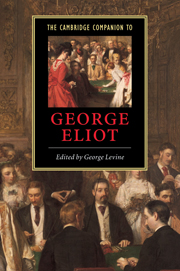Book contents
- Frontmatter
- 1 Introduction
- 2 A woman of many names
- 3 The early novels
- 4 The later novels
- 5 George Eliot and philosophy
- 6 George Eliot and science
- 7 George Eliot and religion
- 8 George Eliot and politics
- 9 George Eliot and gender
- 10 George Eliot and her publishers
- 11 George Eliot
- 12 Works cited and further reading
- Index
11 - George Eliot
Published online by Cambridge University Press: 28 May 2006
- Frontmatter
- 1 Introduction
- 2 A woman of many names
- 3 The early novels
- 4 The later novels
- 5 George Eliot and philosophy
- 6 George Eliot and science
- 7 George Eliot and religion
- 8 George Eliot and politics
- 9 George Eliot and gender
- 10 George Eliot and her publishers
- 11 George Eliot
- 12 Works cited and further reading
- Index
Summary
Appreciation and depreciation
There is something strange in the account of George Eliot's reputation and influence. For a writer so much appreciated, and, one would hardly doubt, of appreciating fame, it is striking to observe the limit points of appreciation, in both senses of the word. I had not thought to find so much depreciation. Given her own vaunted values of sympathy and connection over time, it is all the more noticeable when she is met short of half-way by readers, writers, and critics over the years.
George Eliot herself knew something about reception - reception from others and from the past - and about accrual and passing along. In the last chapter of Book IV of The Mill on the Floss, Maggie Tulliver takes up a little old-fashioned book by Thomas à Kempis and finds that it works miracles to this day. It has gained by its reading over the years, for its name precedes it in familiarity. The corners of pages turned down, the pen and ink annotations now browned by time, mark a way back to à Kempis himself, with his fashion of speech different from that of Maggie's day, but still the voice of a brother.
- Type
- Chapter
- Information
- The Cambridge Companion to George Eliot , pp. 202 - 225Publisher: Cambridge University PressPrint publication year: 2001
- 4
- Cited by



